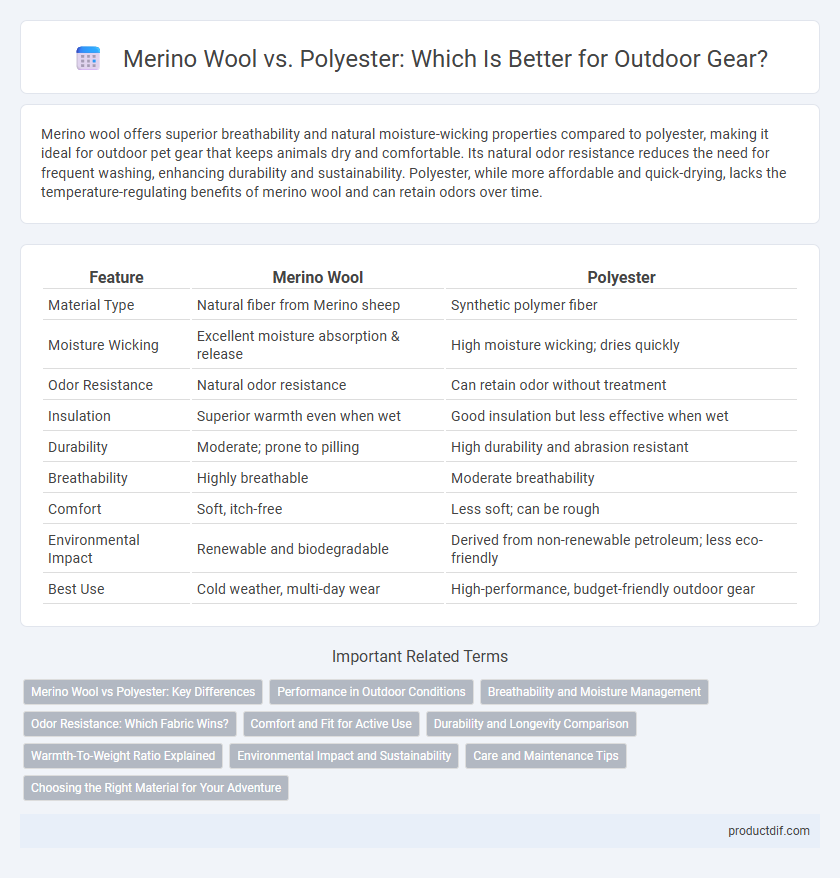Merino wool offers superior breathability and natural moisture-wicking properties compared to polyester, making it ideal for outdoor pet gear that keeps animals dry and comfortable. Its natural odor resistance reduces the need for frequent washing, enhancing durability and sustainability. Polyester, while more affordable and quick-drying, lacks the temperature-regulating benefits of merino wool and can retain odors over time.
Table of Comparison
| Feature | Merino Wool | Polyester |
|---|---|---|
| Material Type | Natural fiber from Merino sheep | Synthetic polymer fiber |
| Moisture Wicking | Excellent moisture absorption & release | High moisture wicking; dries quickly |
| Odor Resistance | Natural odor resistance | Can retain odor without treatment |
| Insulation | Superior warmth even when wet | Good insulation but less effective when wet |
| Durability | Moderate; prone to pilling | High durability and abrasion resistant |
| Breathability | Highly breathable | Moderate breathability |
| Comfort | Soft, itch-free | Less soft; can be rough |
| Environmental Impact | Renewable and biodegradable | Derived from non-renewable petroleum; less eco-friendly |
| Best Use | Cold weather, multi-day wear | High-performance, budget-friendly outdoor gear |
Merino Wool vs Polyester: Key Differences
Merino wool offers superior moisture-wicking and temperature regulation compared to polyester, making it ideal for both cold and warm outdoor conditions. Unlike polyester, Merino wool is naturally odor-resistant and biodegradable, enhancing sustainability and comfort during extended use. Polyester excels in durability and quick-drying properties but lacks the breathability and softness found in Merino wool fibers.
Performance in Outdoor Conditions
Merino wool excels in moisture-wicking and temperature regulation, keeping hikers warm in cold weather and cool during high activity. Polyester offers superior durability and quick-drying properties, ideal for intense outdoor adventures and sudden weather changes. Both materials provide UV protection but Merino wool's natural odor resistance outperforms polyester in extended outdoor use.
Breathability and Moisture Management
Merino wool excels in breathability due to its natural fiber structure, which allows exceptional airflow and moisture-wicking capabilities, keeping skin dry and comfortable during intense outdoor activities. Polyester, while also moisture-wicking, tends to retain odors and can feel less breathable in high-humidity conditions because it traps heat and sweat closer to the body. Outdoor enthusiasts prioritize Merino wool for superior temperature regulation and odor resistance, whereas polyester remains popular for its quick-drying properties and durability in rugged environments.
Odor Resistance: Which Fabric Wins?
Merino wool excels in odor resistance due to its natural antibacterial properties that inhibit the growth of odor-causing bacteria, making it ideal for extended outdoor activities. Polyester can trap sweat and bacteria, leading to stronger odors despite moisture-wicking treatments. For hikers and campers seeking breathable, odor-resistant fabric, merino wool consistently outperforms polyester in maintaining freshness during prolonged wear.
Comfort and Fit for Active Use
Merino wool excels in comfort for active use due to its natural breathability, moisture-wicking properties, and soft texture, reducing irritation during prolonged wear. Polyester offers a snug fit with excellent stretch and durability, maintaining shape even under intense movement, but can trap heat and cause discomfort in high-sweat conditions. Choosing Merino wool enhances comfort with temperature regulation, while polyester delivers a reliable fit and resilience for dynamic outdoor activities.
Durability and Longevity Comparison
Merino wool offers natural resistance to wear and retains its insulating properties even after extended use, making it a durable choice for outdoor gear. Polyester fibers exhibit high tensile strength and resist abrasion, contributing to long-lasting performance in rugged conditions. While polyester generally outperforms Merino wool in terms of tensile durability, Merino's moisture-wicking and odor-resistant qualities extend the functional lifespan of garments in outdoor environments.
Warmth-To-Weight Ratio Explained
Merino wool offers an exceptional warmth-to-weight ratio by efficiently trapping heat while remaining lightweight and breathable, making it ideal for outdoor gear. Polyester, though lightweight and quick-drying, typically provides less insulation per gram compared to Merino wool, affecting overall warmth in cold conditions. Choosing Merino wool enhances thermal regulation and comfort without adding bulk, crucial for high-performance outdoor activities.
Environmental Impact and Sustainability
Merino wool is a biodegradable and renewable resource, reducing environmental impact through natural fiber decomposition and sheep grazing practices that promote soil health. Polyester, derived from petroleum, contributes to microplastic pollution and is energy-intensive to produce, raising concerns about its sustainability in outdoor gear. Choosing Merino wool supports eco-friendly manufacturing and circular economy principles, making it a preferred option for environmentally conscious consumers.
Care and Maintenance Tips
Merino wool requires gentle washing in lukewarm water with mild detergent to preserve its natural fibers and prevent shrinking, while polyester is more durable and can withstand machine washing on a regular cycle. Avoid using fabric softeners on Merino wool to maintain its moisture-wicking and odor-resistant properties, whereas polyester can handle such products without damage. Air drying Merino wool garments flat prevents distortion, whereas polyester items can be tumble dried at low heat without losing shape.
Choosing the Right Material for Your Adventure
Merino wool offers superior moisture-wicking and natural odor resistance, making it ideal for multi-day adventures and varying temperatures. Polyester excels in durability and quick-drying properties, perfect for high-intensity activities in wet conditions. Selecting Merino wool enhances comfort through breathability and softness, while polyester provides rugged performance and affordability for extended outdoor use.
Merino wool vs Polyester Infographic

 productdif.com
productdif.com